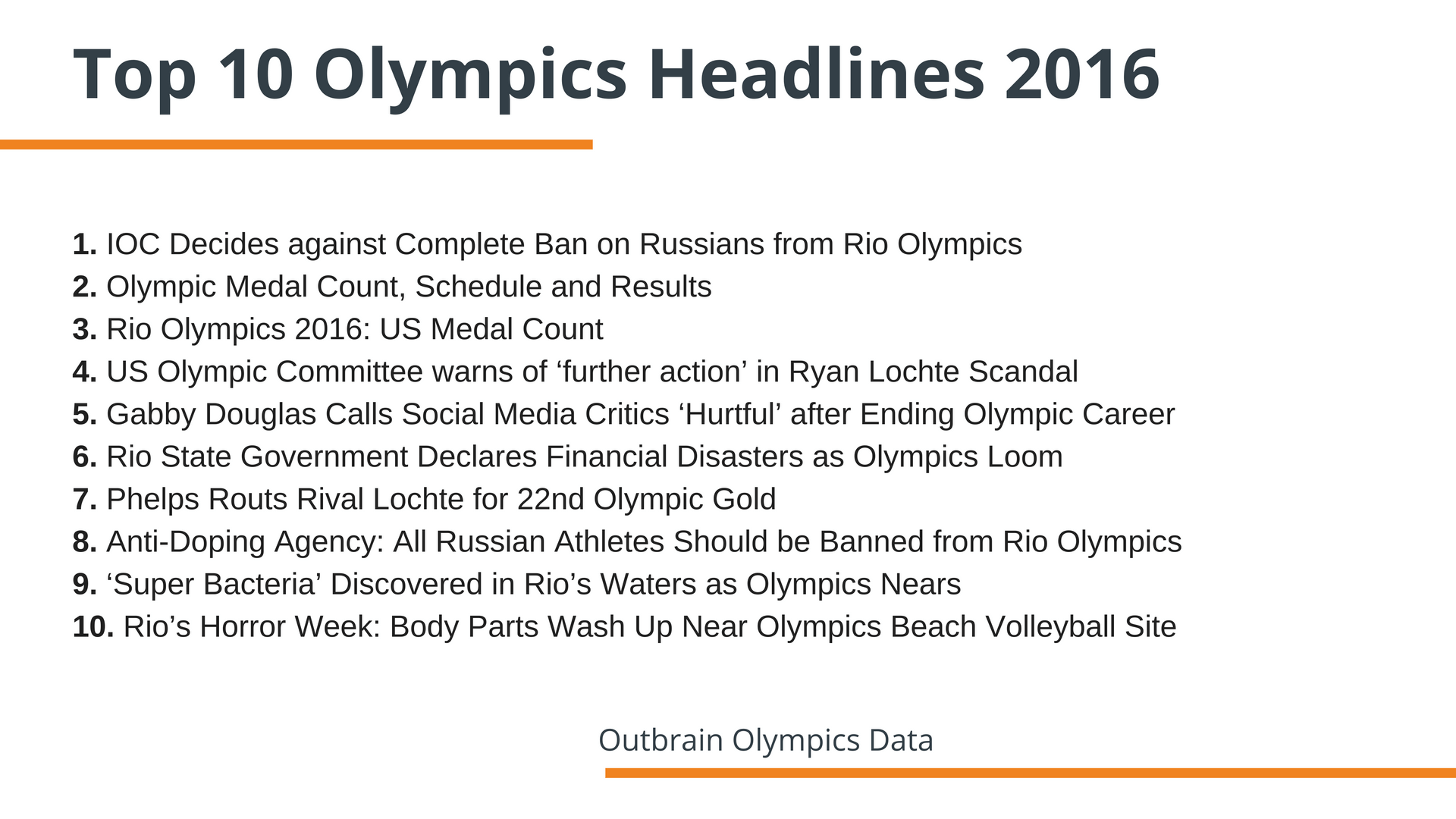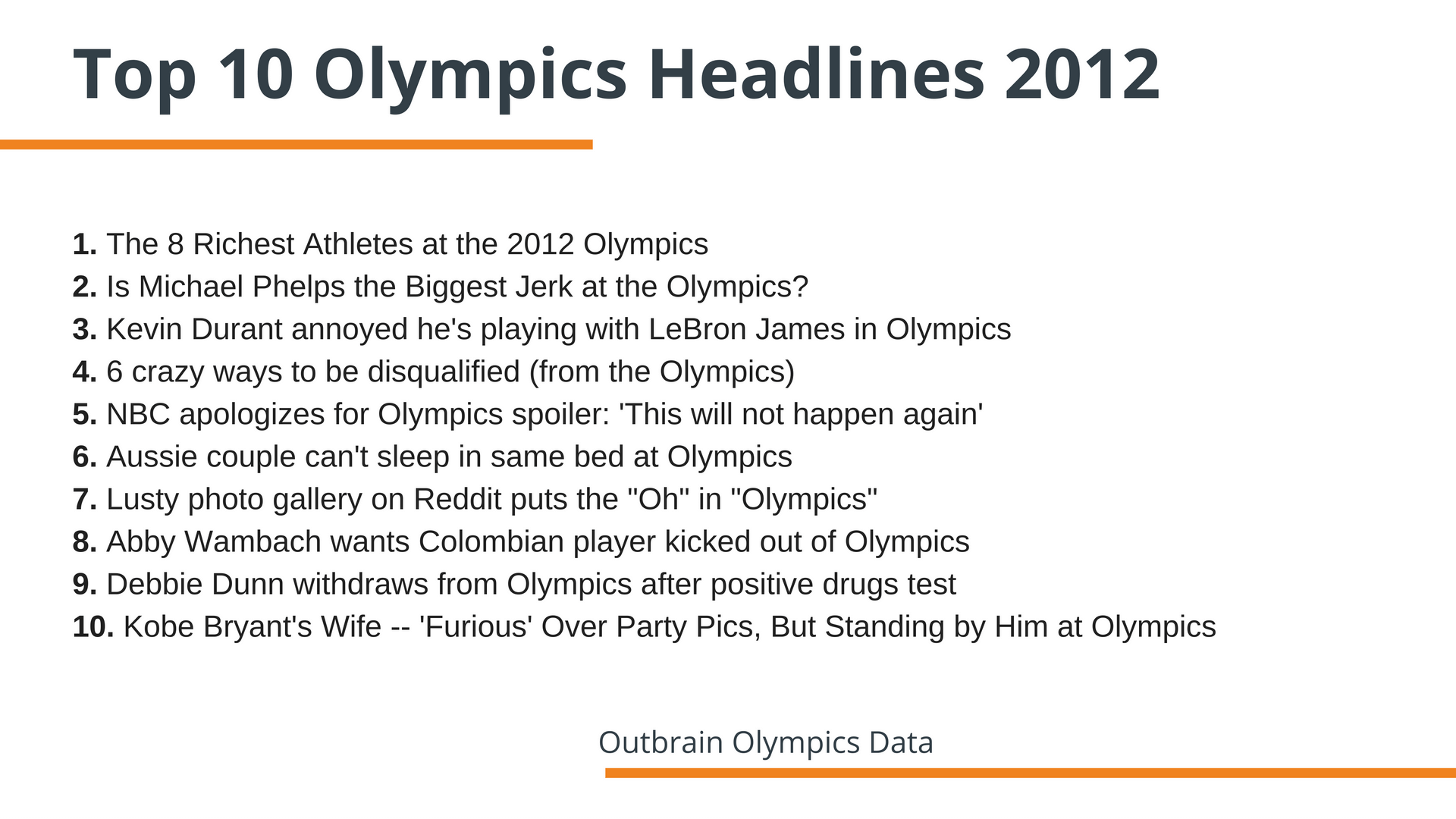Why Were Rio Olympics Ratings So Dismal: Insights from Outbrain Data

This week, everyone was talking about the disappointing U.S. viewership of this year’s Olympics. Deadline reported that the Rio Olympics numbers had fallen 12% night-for-night from 2012. Additionally, the final Friday for Rio had an audience drop of 19% from the comparable night of London 2012, which, incidentally, was one of the lowest rated nights of that Olympics four years ago. Moreover, viewership among 18-to-49-year-old’s dropped by 25%.
While live-streaming is one factor, that’s still a big dip, especially given that this wasn’t necessarily a global trend. So, what went wrong?
The Buzz Before and During: A Comparison
We took a look to see if our headline data on the Olympics for 2012 vs. 2016 had any insight. Here’s what we found.
The most clicked headline in 2012 was “The 8 Richest Athletes at the 2012 Olympics,” which was published four days after the 2012 Olympics began.
Meanwhile, in 2016, the biggest spike in Olympics data consumption happened on 7/24/2016, 12 days before the opening ceremonies. The headline? “IOC decides against complete ban on Russians from Rio Olympics,” an Associated Press story that ran on multiple outlets.
Additionally, 7 out of 10 of the top headlines we pulled from June 1st to the day after the Olympics were also arguably negative. And while the top 10 Olympic headlines in 2012 weren’t exactly beacons of positivity, their tenor was certainly more playful than grave.
|
|
|
|
A deeper look into our data from the period of 6/26/16 to 7/28/16 also reveals that whereas the largest content volume by keyword around the Olympics contained the keywords Russia and Zika, the two most in-demand keywords (which were offered to audiences in relatively low volumes) were track and basketball.
So, while people may have wanted to read about the athletes and more positive (or even silly) stories, the majority of the content on the Olympics was far more negative.
One extrapolation is that all the negative coverage could have impacted the excitement going into the Olympics. Also, because the negative buzz peaked so early, it is possible that people were turned off by the games and neglected to consume content — or tune in — as the event progressed.
However, that’s just one piece of the puzzle. When taking in the bigger picture of the Olympics media coverage, here are some additional theories as to why we saw the ratings slip.
1. Competing Headlines
Pre-Olympics, our focus was elsewhere —, particularly among the coveted Millennial audience. If anything, July was the month of Pokemon Go, a viral sensation. One theory is that for these viewers, VR proved more engaging than real sports unfolding in front of them. Additionally, no one will disagree that this year’s election is uniquely engaging, with a new devastating headline emerging daily — if not hourly. It may have also been a distraction.
2. Complementary Headlines
It is also possible that “IOC decides against a complete ban on Russians from Rio Olympics” story took on more steam because of how it tapped into the overall storyline about Russia that has been unfolding in the US media. It is notable that July 27 (peak consumption day for Olympics-related content) was also when the Russia DNC hack gained credibility by American Intelligence. News outlets released a number of stories about this on July 27, the same day that the IOC Olympics headline peaked. While just a theory, it is possible that the Russia vs. American storyline was starting to sharpen and that the IOC’s ban lift only fueled more flame in the fire. It is also possible that people were just increasingly more interested in Russian-dominated storylines. Publishers may also have seen more click-throughs with this type of content and spotlighted it.
3. NBC Messed Up
Aside from the fact that people don’t consume content by one network anymore, NBC was ripped apart for its coverage. Watchers griped about heavy commercials, sexist comments, and bad programming decisions — and took to social media to vocally air these grievances. Whether it was Dan Hicks claiming the coach and husband of Katinka Hosszu was “the guy responsible for her turnaround,” or airing gymnastics at midnight, there’s no debate that NBC made some big blunders and that viewers may have tuned out in retaliation.
Additionally, from a purely content marketing standpoint, NBC missed a huge opportunity by neglecting to talk about the Olympics at least a year ahead. Instead, they started seeding information about it six months before — ultimately building to a big unveil.
What they should have focused on is telling the kind of heroic, positive stories that get audiences charged about the event and watching. They could have picked out new faces that were exciting and focused on all their hard work and training — and all the emotions that come with it. Instead, the drama is packed into the event coverage and then via retrospectives afterward. Blanketing the space with uplifting stories and names we can put faces to before the event seemed particularly important this year, given that the Olympics received so much negative coverage.
4.The Negative Headlines Kept on Coming
In addition to the NBC sexist blunders, there were sexist and racists blunders all over the place. Add to this, the green Olympic pool and the Ryan Lochte embarrassment later in the game. Overall, the Olympics narrative was overwhelmingly negative this year, drowning out any positive coverage that emerged. (Note the top 7 out of 10 headlines.) This may have also been a contributing factor.
5. Olympics is No Longer a TV Event
No surprise here — we’re in the death of event TV. This is a statement we hear time and time again. Super Bowl ratings also saw all-time lows and so did March Madness Championship ratings.
Whereas people used to sit around the TV watching the Olympics together — and most sports — that is happening less and less. The recent Olympics ratings only further support this trend. And to be honest, while 2012 Olympics ratings were better than this year, they were also an all-time low.
6. The US Performed too Well
Slate’s Justin Peters had an interesting theory that the US victory has become so normalized that viewers now ignore great performances. The drama — particularly for most covered sports like swimming and gymnastics — wasn’t there. Meanwhile, the sports the U.S. doesn’t dominate, like table tennis, badminton, and diving weren’t covered by NBC.
What Now?
Already, there’s buzz about Japan hosting the next Olympics. Everyone’s hoping that the next Olympics will be a turn in a better direction. Early headlines seem promising, with their prime minister dressed up as Mario, “green” medals, and exciting new technology. But will it be enough to draw people in and will the headlines be as positive a month before the Olympic events commence? And, moreover, will it be enough to combat all the other competing trends? We’ll have to wait and see how it all unfolds.
As our data shows, exposure to positive or negative headlines early on definitely does appear to be one piece of the story — something that NBC could take to heart next year, when developing a content marketing plan for Tokyo.
Overall, what we can say, is this: 2016 viewers were not that impressed. Regardless of the reason, they tuned out. And the marketers that rely on their dollars will need to work hard to make them tune back in.














